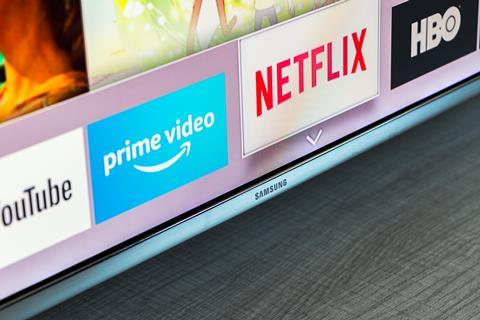With the European launch of subscription service Disney Plus next week, consumers now have more choice than ever for watching content on demand. But could the cost of multiple subscriptions drive an increase in piracy?

For a period, it seemed like the TV and film industry was winning the battle against streaming piracy.
The rise of subscription streamers Netflix and Amazon Prime, offering a wide selection of content at a relatively affordable price, meant that consumers turned away from peer to peer filesharing applications like Napster, Kazza, BitTorrent, Gnutella and eDonkey which exploded in use between 2006 and 2010.
Indeed, last year Ampere Analysis found that streaming piracy had fallen steadily over the three years between 2017 and 2019, with particularly sharp declines in Spain, the US, the Netherlands and France.
Ampere’s research found that in markets where catch up or SVOD online video viewing has risen the most, piracy has experienced the biggest drop.
“With the growth in all-you-can-eat legal services, users no longer need to turn to illegitimate sources to get their viewing fix”, says Richard Broughton, director at Ampere Analysis.
However, he cautions that the on-demand market is now moving into a period of ‘siloisation’ where producer and distributor brands go direct to the consumer, at the same time restricting the amount of content they license to third-party services.
This ‘siloisation’ trend has accelerated with the arrival Disney Plus, Apple TV+ and BritBox, and upcoming launches like Peacock, HBO Max and Quibi, all ranging in price between $5 and $15 a month. Many of the studios are pulling content like Friends or The Office from rival platforms to offer exclusively on their own services.
This could in turn spark a resurgence in streaming piracy.
“If the mainstream OTT players have less of the content users want to watch, when they want to watch it, there’s a genuine risk that usage of these SVoD and catch-up services could begin to slump, something the pirate operators will be quick to capitalise on,” says Broughton.
One of the reasons for this is cost. Access to all the leading services now costs upwards of £50+ a month. Research suggests that some consumers may be willing to subscribe to up to four or five online video services, if the price is right. A recent Grabyo report, for example, found that 28% of UK customers currently subscribe to two or more online video services, while 35% do so in the US, and 32% across Europe.
But this leaves a significant number unable or unwilling to pay for multiple services.
- Read more: SVOD: Price is right
Indeed, 37% of respondents to a survey by price comparison site Broadband Genie said that they would consider using illegal sources instead of paying for content should fragmentation continue to grow.
Almost a fifth of the survey’s respondents admitted that they currently often or occasionally access content via illegal streams or file sharing.
Among the reasons for doing so are cost, as well as frustrations at having to use different interfaces and the difficulty of finding particular content. Indeed, convenience is a key reason for people taking the illegal route when hunting out their favourite TV shows and films.
Sharing is caring
One of the simplest forms of piracy is password sharing. “It seems that piracy has moved from ripping DVDs and selling them on the street to sharing passwords for streaming services,” Jon Finegold, CMO at Signiant, whose software is used widely across the B2B supply chain and often used for distributing content securely to platforms across the globe, tells IBC365.
Many consumers now don’t see why illegal streaming or download is seen as a bad thing, in large part thanks to the attitude of Netflix and Amazon Prime’s towards account sharing.
Three years ago, CEO Reed Hastings said password sharing is “something you have to learn to live with, because there’s so much legitimate password sharing — like you sharing with your spouse, with your kids.”
Recently, there have been indications that the company may be reconsidering its tolerance. On an earnings call last year, Netflix chief product officer Greg Peters said it is “looking at the situation” and seeking “consumer-friendly ways to push on the edges of that.”
The issue of password sharing and potential features that could help prevent it are now being discussed by the Alliance for Creativity and Entertainment (ACE), which counts Amazon, Netflix, HBO, and Disney as members.
“It seems that piracy has moved from ripping DVDs and selling them on the street to sharing passwords for streaming services,” Jon Finegold, Signiant
Some discussed tactics to prevent illegitimate password sharing include periodic account password resets and texting codes to account holders to let them keep watching movies and TV shows, according to reports.
Other suggested tactics reportedly include restricting access based on a user’s geographical location. Even fingerprint recognition as an authentication feature has reportedly been discussed.
Research firm Park Associates reported that piracy and account sharing will cost streaming video providers $12.5 billion in 2024, an increase of 38% over 2019’s loss of $9.1 billion. It calculated that 27% of US broadband households are involved in some form of video piracy or account sharing, the research firm said. And 13% of consumers surveyed make use of a piracy website or app, it added.

“Piracy is a complex issue that cannot be addressed with a single solution or by targeting a single-use case,” says Brett Sappington, senior research director and principal analyst at Parks Associates. “Most pirates also subscribe to at least one OTT service. They are not simply thieves looking to steal content but are video enthusiasts who engage with many different services.”
Indeed, there are fears that the widespread economic contraction being caused by coronavirus could lead to a spike in streaming piracy. Amid job losses and falling household incomes, the thinking is that many consumers might cut subscription spend and turn to piracy to watch content for free, and do so in greater numbers given the restrictions on movement being enforced by governments around the world.
And if proof is needed that the threat of piracy has not faded, consider this: the premiere of Game of Thrones’ final season last year was estimated to have been streamed or downloaded illegally more than 54 million times in the 24 hours after it first aired. The battle against piracy has certainly not yet been won.





















No comments yet